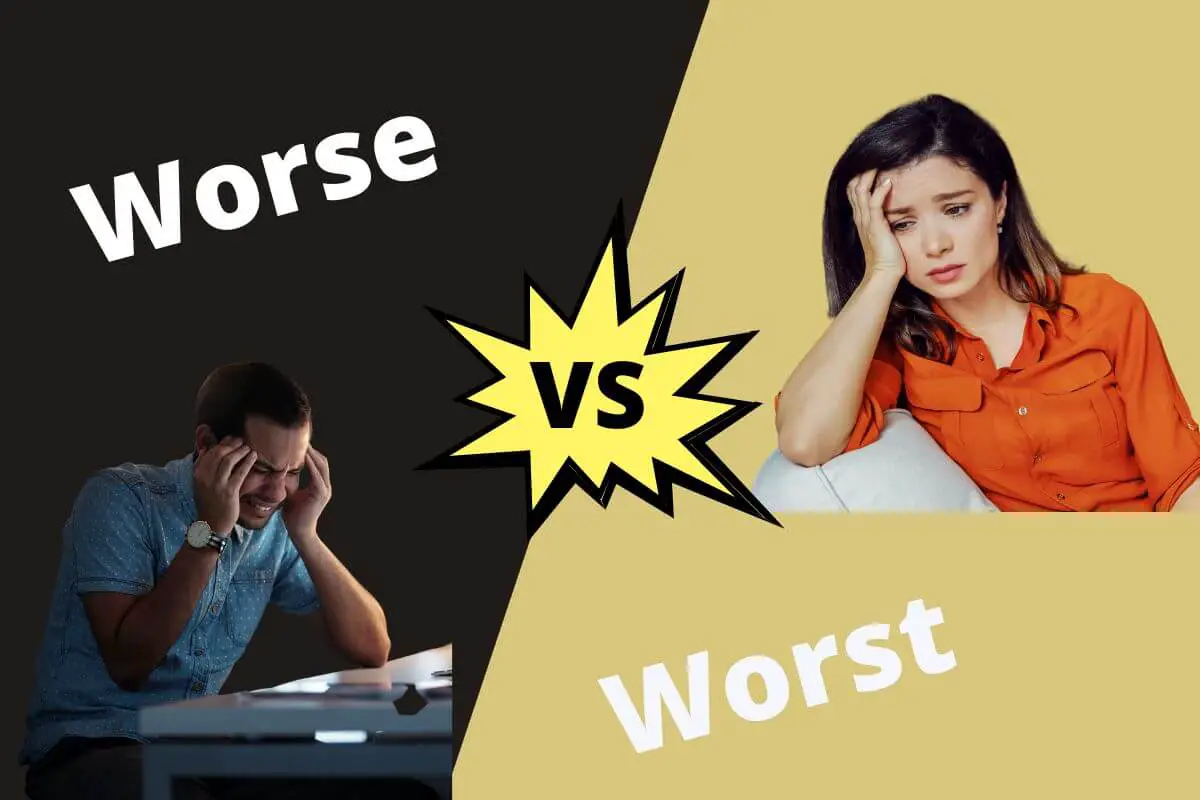The main difference between worse and worst is that worse means comparative degree, while worst means superlative degree.
Table of Contents
Worse vs Worst
| Worse | vs | Worst |
| Worse is the comparative form of bad. It means a comparison between two bad things. | Definition | Worst is the superlative form of bad. It means the highest point of discomfort, disgust, and disappointment. |
| Middle English | Origin of the word | Middle English |
| Adjective/ adverb | Parts of speech | Adjective/ adverb |
Definition of Worse
Worse means lower quality or lower standard. It’s the opposite of better and the comparative adjective of bad.
We use worse when comparing two things for their inferiority and badness.
Examples of Worse
- The food here is even worse than the service.
- My test results are worse than my last test.
- My dress is worse than yours.
- His test scores are bad, but mine are worse.
- This year, the flood’s effects are worse than last year.
- Now my opinion of her is even worse than before.
Worse is compared to two bad things or experiences. Instead of using the positive degree word bad, all the examples used worse because this is the comparative form of bad.
Worse is often used as idioms as well.
Common Expressions Using Worse
- A false friend is worse than an enemy.
- For better or for worse.
- One’s bark is worse than one’s bite.
- The treatment is worse than the disease.
- Take a turn for the worse.
- Fate is worse than death.

Definition of Worst
The meaning of worst is the same as worse, expressing the lowest standard, lowest quality, or least good. Worst, however, is the superlative adjective and not the comparative one.
When explaining the meaning of worst, we used superlative degrees for all meanings as opposed to comparative degrees when we explained the meaning worse.
We use worst to mean the highest degree or level of low standard or dislike for something.
Examples of Worst
- Out of Mary, Rose, and Steven, Rose got the worst score.
- I had the worst experience at my dance class today.
- I made the worst assembly speech today.
- She lost her pet. This is the worst thing that could happen to her. She loved him so much.
- Businesses are the worst affected by Covid lockdowns.
- Isn’t his behavior the worst?
- He is the worst person I have met to date.
- That was the worst movie I have watched in the past few months.
Common Expressions Using Worst
- Man is his own worst enemy.
- I wouldn’t wish such a bad phase, even for my worst enemy.
- The worst is yet to come.
- The shoemaker’s wife goes the worst shod.
- The worst wheel makes the most noise.
- This is the worst-case scenario.
- Debt is the worst kind of poverty.

Worst vs Worse: Key Differences
Degree of the Words
The different degrees of the words are the first things that separate these homophones. Worse represents the comparative form, whereas worst represents the superlative form.
We use worse to compare two bad things or incidents, and we use the word worst to express the highest degree of displeasure or disappointment.
Meaning
Even though both the words represent the same emotion, there is a slight difference in meaning. We use the word worst when we feel extremely disappointed by something or someone.
If there are two struggling athletes and we need to describe which one struggles more, we’d say one athlete is worse than the other.
More Examples of Worse
- His interest in studies is getting worse after his parent’s divorce.
- This place is worse than we thought.
- The unemployment rates are getting worse every day.
- He made the situation even worse.
- The Covid situation is getting worse than last month.
- His badminton rackets are worse than mine.
- His performance was worse than yesterday.
More Examples of Worst
- This is her worst book to date.
- I bought the worst bike. I always have some issues.
- The worst part of my work is the long commute.
- He gave me the worst piece of advice, knowingly.
- The Southern part of the city is the worst hit by the storm.
- She helped me even in the worst times
If you found this article helpful, check out our post comparing awhile versus a while.

